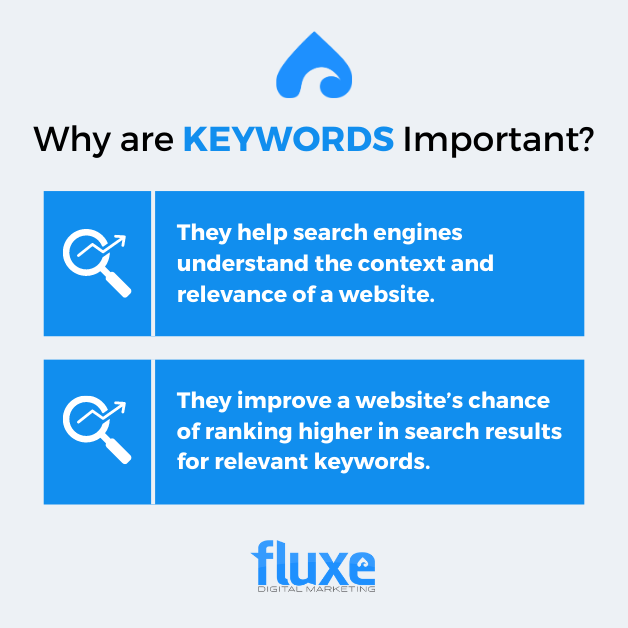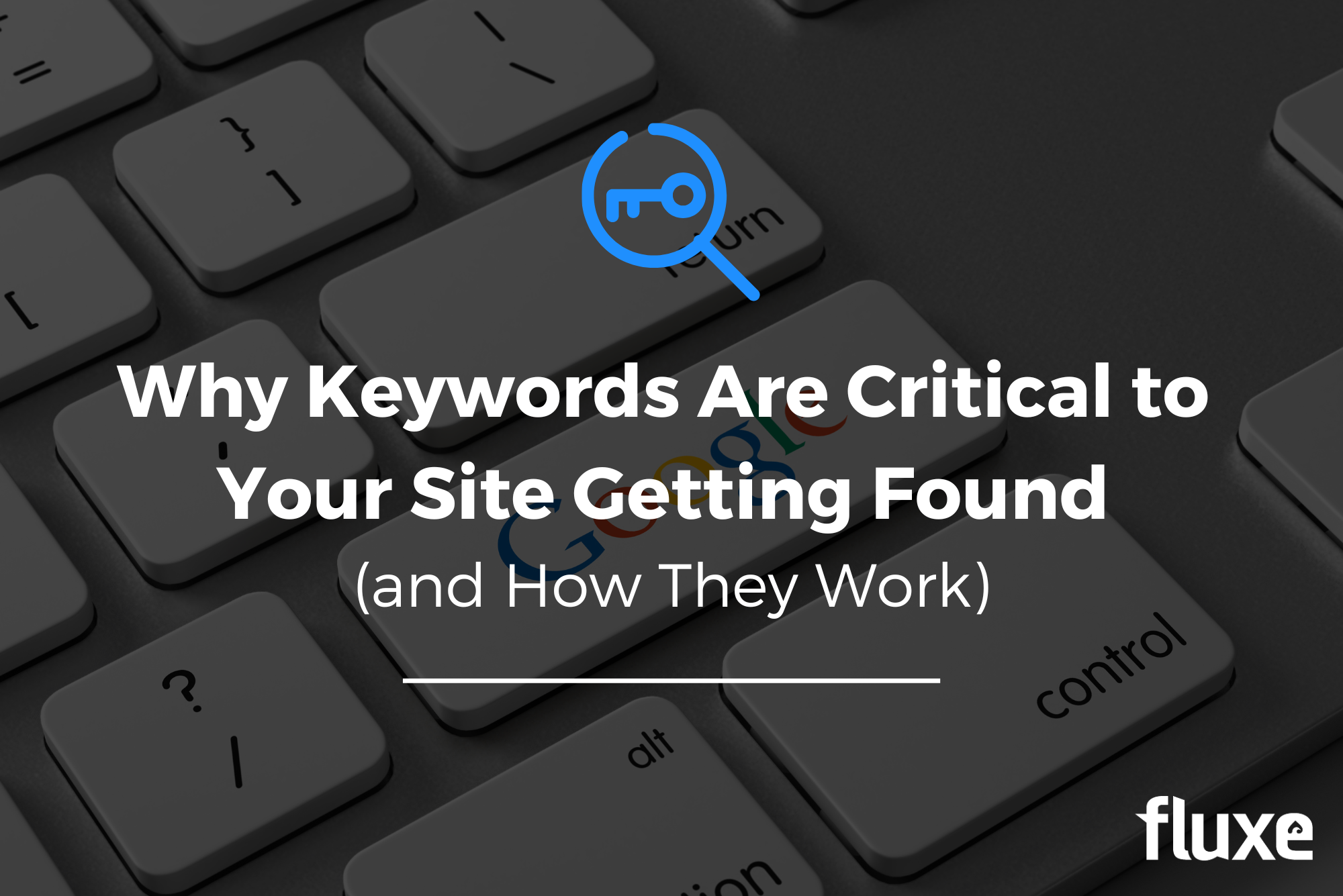After months of labor, your business finally has the perfect website.
It’s an informative, valuable, straightforward set of pages that will surely position you as a leader in your industry. You launch your new site, sit back, and wait for the clients to pour in…
Days pass. Weeks pass. Where’s all your digital traffic?
If this sounds familiar, you might be skipping an important digital marketing step: search engine optimization, or SEO. SEO refers to adjustments you can make that motivate search engine algorithms to rank your website higher in search results. Your business may have the greatest website in the history of websites, but if potential clients can’t find you on the first few pages of Google, you may as well go back to printed business cards.
How do you optimize your website to its fullest potential? Let me introduce you to keywords. In order for your site to achieve its goal — to successfully attract organic qualified leads — you need to understand why keywords are important.
Why Are Keywords Important for SEO?
Keywords are the words or phrases your potential website visitors type into the search engine of their choice — usually Google. The more you integrate keywords into your website, the easier it is for prospects to find you online.
So, why are keywords important for SEO?
To give you some perspective, an estimated 150 million active websites live online today. That number’s higher than the populations of Canada, Argentina, and Italy combined. That’s a lot of competition!
This is where keywords come in.
One factor Google uses to determine a website’s relevance is the presence of keywords. The keywords you use on your pages help search engines understand the context and relevance of your website. When someone performs a search, the search engine looks for websites that contain the keywords used in the search. Google’s powerful algorithm scans the content of all the websites it has indexed to find the ones it perceives as most relevant to the user’s search query.
By integrating relevant keywords into their websites, business owners improve their chance of ranking higher in relevant search results. This leads to more visibility for the business, more traffic to the website, and more potential customers.
Important note: According to Moz, searchers click through to the second page less than 6% of the time. That means if you aren’t ranking on the first page, you won’t be found. Another good reason why you need SEO in your toolbox!
Optimizing with relevant keywords can also help businesses attract the right kind of traffic. For example, a business that sells hiking gear should use keywords related to hiking and outdoor activities on their website so they can attract the right kind of buyers — hikers and outdoorsmen. Examples of those keywords might be:
- Best hiking gear
- Hiking gear for sale near me
- Fishing and hiking gear
For this to work, the content writer has to understand what the searcher ultimately wants out of their search. If you don’t understand how the searcher is thinking about what they’re looking for, you may use the right keyword, but you won’t necessarily create relevant content that matters to them.
In short, keywords are important for SEO because they:
- Help search engines understand the context and relevance of a website
- Improve a website’s chance of ranking higher in search results for relevant keywords

What Role Do Blog Posts Play in Keyword Rankings?
Want your website to rank for keywords? Start by publishing blog posts.
Blog posts offer businesses more opportunities to include keywords relevant to their products and services. You can certainly add keywords to your home and product or service pages, but you don’t want to cram them full of unnatural-sounding language just for the sake of SEO. Visitors won’t respond well to that, and neither will Google.
Blog posts, though, provide an unending source of new content that you can optimize with keywords every time. You may target some keywords on your main webpages, but some keywords may be longer phrases or specific questions that just don’t fit into your main site’s content very well. A blog gives you the opportunity to optimize for all of them, one or two at a time.
When someone searches for a keyword related to your latest blog post, the search engine recognizes your content’s relevance and shows the post to the user in their SERPs. If that person clicks on your post, not only do they get useful information in response to their search, they can also get exposure to your website as a whole.
In this way, keyword-optimized blog posts help your business attract digital traffic.
While keywords themselves are important for SEO, did you know Google also looks at the text surrounding your keywords? This is called contextual relevance, and it helps Google better understand what your page is about. By “surrounding text,” I mean the text right next to (2–5 words away from) the keyword or key phrase you care about.
For example, if you have a page about “hiking shoes” and you want to rank for that phrase, it’s important that your page uses the keyword a few times. You can also include it in the title tag and meta description. But Google will also look at other things, like:
- The theme of the page (Is it about hiking shoes, or does it only mention them?)
- The context of the surrounding paragraphs and sentences (Do they talk about hiking shoes?)
- The variations of the keyword in different parts of your content (Are there a few different ways to say “hiking shoes?”)
Google wants to make sure your content is relevant before showing it to searchers. Otherwise, the search engine isn’t doing its job very well. So if you’re trying to rank for “hiking shoes,” but your page doesn’t actually talk about hiking shoes (or it does, but only in passing), Google will know it isn’t a good match for this keyword.
How Keywords Help Medical Practices
Many of my clients own medical practices, and a question I hear often during the onboarding process is, “Are keywords really relevant for my field?” My answer is, unequivocally, Yes!
Blog posts can absolutely improve search engine rankings for keywords related to medical services. A dental practice may publish a blog post about the importance of regular cleanings, and include keywords about “teeth cleaning” and “oral hygiene.” As a result, search engines will better understand the website’s relevance, improving the chances of it ranking higher in the SERPs.
If you have a blog, you give search engines more to work with. When people search for keywords related to your area of practice, whether that’s dentistry, orthodontia, podiatry, or anything else, Google can potentially display your recent blog post as a result.
If your blog post ranks high and the title or meta description seems relevant to the searcher, they may click through and visit. They receive a helpful answer to their question, and you build credibility and trust with them as an expert in your field. Both can potentially lead them to your practice’s website and, eventually, your front door as a future patient.
You can think of a medical practice’s blog posts as a way to “show off” their knowledge and expertise, much as a chef might show off their skills with a cooking demonstration. This can attract potential patients and improve the practice’s online presence.
How Keywords Help Local Businesses
Keywords are extremely important, and not just for global brands! Personally, I think smaller, local businesses can benefit from keyword ranking even more than household name brands can.
When local businesses rank on Google, they attract more customers in their target area. When someone performs a search on Google, the search engine uses their exact location to provide geographically relevant results.
For example, if someone searches for “pizza” from their phone, Google answers with a convenient list of nearby pizza restaurants. Thus, the pizza restaurants who know how to rank with Google attract more local customers and see more revenue.
Local businesses can also use Google’s business listing service, Google My Business, to manage their online presence and provide information like their address, hours of operation, and phone number. Potential customers can then find and contact local businesses more easily.
How Keywords Can Help You
Now that you understand why keywords are important for SEO, you might be eager to jump in and crank out some valuable keyword-based content.
But hold on! Do you have the marketing knowledge necessary to create well-optimized blog posts? Do you have the time to commit to blogging? How about a way to gauge the effectiveness of your content marketing efforts?
Blogging isn’t for every business owner — and that’s where content marketing agencies come in. If you’re interested in using keyword-integrated blog posts to help your business, get in touch. I’d love to help.



